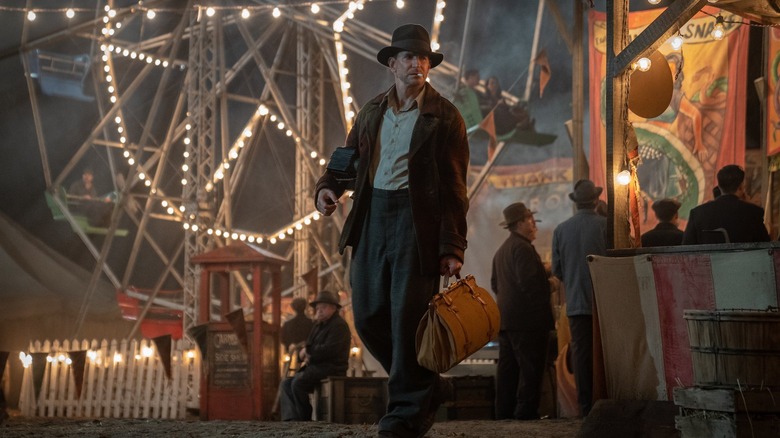Guillermo Del Toro Explains How The Characters Of Nightmare Alley Could Fit In Today's World
It's 1939, and the world is reeling from both the Great Depression and the onset of World War II. Americans from all walks of life turn to anything to help them escape the cold reality of the world — whether it's the wonders of a traveling carnival show or the promise of spiritual catharsis offered by a mentalist who can supposedly speak with the dead.
That's the backdrop of "Nightmare Alley," the new noir melodrama from director Guillermo del Toro, whose previous films have included modern horror and fantasy classics like "Pan's Labyrinth," "The Devil's Backbone," "Crimson Peak" and the 2018 Best Picture Oscar winner, "The Shape of Water."
With "Nightmare Alley," based on a 1946 novel and previously adapted as a film in 1947, del Toro tells a story as dark as any he's created. Bradley Cooper plays Stanton Carlisle, a small-time drifter and scammer who hooks himself to a traveling carny show and finds himself working for a pair of mentalists (Toni Collette and David Strathairn), while also wooing the naïve "electric girl" Molly (Rooney Mara).
Stanton soon strikes out on his own, confident he can take the mentalist act and turn it into psychic bait for the well-off in the big city of Buffalo. It's only when he runs into an enigmatic woman named Lilith Ritter (Cate Blanchett) that he realizes he may not be the only con artist in town.
"Nightmare Alley" is a story of greed, vengeance, emotional manipulation and lust for power, and although it's set in 1939, its characters and themes can easily speak to the world today. "We wanted to imbue the movie with the anxiety of this time," says del Toro during a press conference to promote the film. "Because we wanted not to make a movie about the period, we wanted to make it about now."
Del Toro wanted to make a period piece relevant to today
Many of the characters in "Nightmare Alley" are hucksters of one kind of another. Stanton portrays himself as someone who's capable, dependable and honest, while the carny workers are selling their acts as things that truly exist in the world. Meanwhile, characters in the city like Lilith Ritter or wealthy industrialist Ezra Grindle (Richard Jenkins) hide themselves behind veneers of respectability and power.
"There are characters that mean for me, different things," says del Toro. "I think that crucial moment we are in, which, at an almost basic level, is about truth and illusion, or truth and lies, is so dependent on us being gullible, or us being capable of being compassionate."
Today's world is also about selling certain personas and concepts whether they're truthful or not, which is something that del Toro wanted to touch on in "Nightmare Alley." The film also addresses the need to acquire material wealth even at the expense of one's soul, and our ability to be humane even in dark circumstances.
"I think what's very interesting for me about the character of Stan is ... I believe that there is an emptiness in him, and a need for more and more and more that I also find pertinent," explains del Toro. "And Grindle wants to be forgiven, which I think there's also an urgency for us to be human and be capable of forgiveness, and be capable of seeing each other ... the movie is permeated with that. These characters mean something to me, (and) hopefully, they reflect the time."
"Nightmare Alley" is out in theaters December 17.

